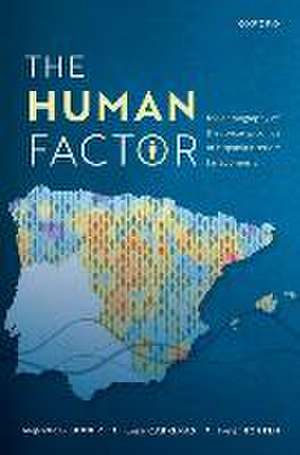The Human Factor: The Demography of the Roman Province of Hispania Citerior/Tarraconensis
Autor Alejandro Sinner, Cèsar Carreras, Pieter Houtenen Limba Engleză Hardback – 20 mai 2024
Preț: 782.36 lei
Preț vechi: 909.72 lei
-14% Nou
Puncte Express: 1174
Preț estimativ în valută:
149.71€ • 156.62$ • 124.36£
149.71€ • 156.62$ • 124.36£
Carte disponibilă
Livrare economică 01-07 martie
Preluare comenzi: 021 569.72.76
Specificații
ISBN-13: 9780192848598
ISBN-10: 0192848593
Pagini: 512
Ilustrații: numerous black and white and colour images and maps
Dimensiuni: 164 x 240 x 32 mm
Greutate: 1 kg
Editura: OUP OXFORD
Colecția OUP Oxford
Locul publicării:Oxford, United Kingdom
ISBN-10: 0192848593
Pagini: 512
Ilustrații: numerous black and white and colour images and maps
Dimensiuni: 164 x 240 x 32 mm
Greutate: 1 kg
Editura: OUP OXFORD
Colecția OUP Oxford
Locul publicării:Oxford, United Kingdom
Notă biografică
Alejandro G. Sinner holds a BA in History, an MA in Archaeology, and a PhD in Classical Archaeology (Society and Culture) from the University of Barcelona. His research focuses on the social, economic, and cultural history of the Late Iron Age Iberia, Roman Hispania, and the western provinces. Most notably, he has conducted research and published on Ibero-Roman material culture (especially ceramics and coinage), demography, Palaeohispanic languages, pre-Roman and Roman domestic and religious spaces, and the construction and negotiation of identities and the processes of cultural change and exchange in ancient colonial contexts.Cèsar Carreras holds a BA in History from the University of Barcelona, an MA in Archaeological Computing from Southampton University, a PhD in Archaeology from Southampton University, and a PhD in Classical History from the University of Barcelona. He is a Senior lecturer in Classical Archaeology at the Autonomous University of Barcelona. Dr Carreras's research focuses on the Roman economy from amphora studies in different European countries (UK, the Netherlands, Germany, Spain), transport costs with the use of network analysis in GIS, and ancient demography. He has published widely on these and other topics, and has been involved in many geophysics fieldwork projects in the Iberian peninsula. He is currently involved in excavations at the Roman castellum of Puig Castellar (Biosca), and the Roman cities of Iesso (Guissona), and Iulia Libica (Llívia).Pieter Houten holds a BA in History and an MA in Ancient History, both from Utrecht University, and a PhD in Ancient History from Leiden University. His work focusses on social processes such as urbanisation and Latinization in the Roman west, combining archaeological, epigraphic, and historical sources to obtain a clearer picture of these and other social processes using Geographic Information Systems. Within the ATLAS-project (www.atlas-cities.com) at Universität Hamburg he researches the Late Antique cities of Southern Spain and Tunisia. For the LatinNow project (www.latinnow.eu) at the University of Nottingham he studies the spread of Latin during the Imperial period, especially those who learned to speak and write Latin as a second language next to the palaeohispanic languages. His PhD-research on urban settlement on the Iberian Peninsula during the Early Empire has been published as Urbanisation in Roman Spain and Portugal (2021).
